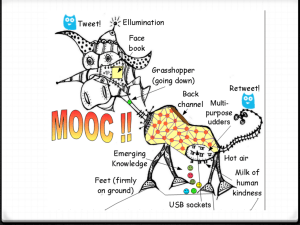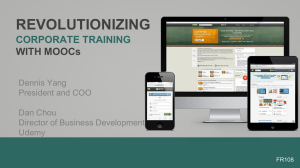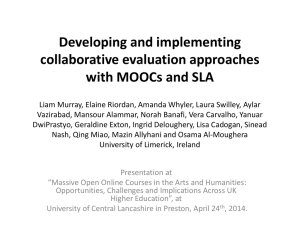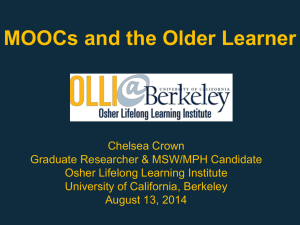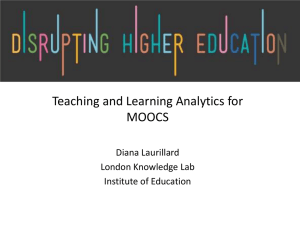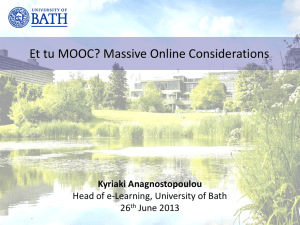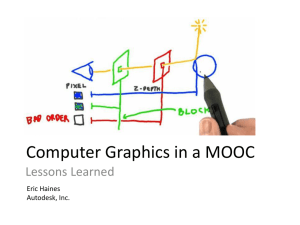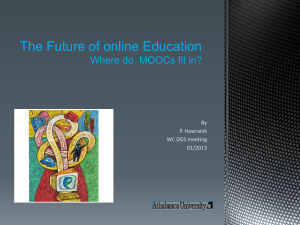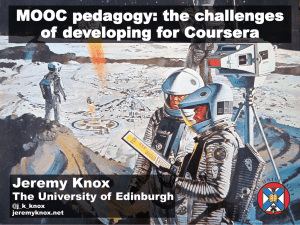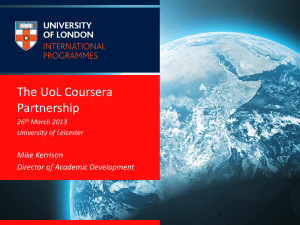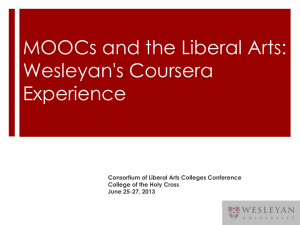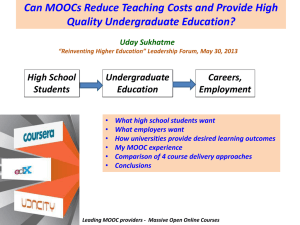here - icsle 2014
advertisement
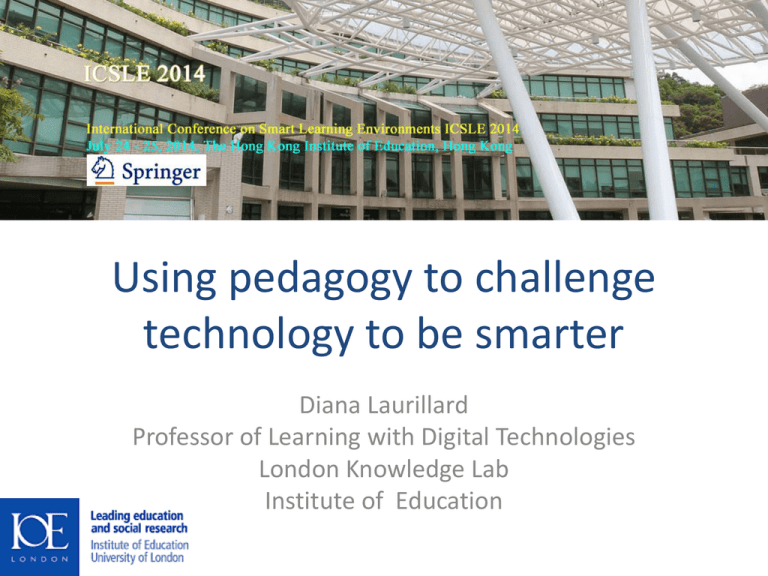
Using pedagogy to challenge technology to be smarter Diana Laurillard Professor of Learning with Digital Technologies London Knowledge Lab Institute of Education Outline • • • • • • • • Why we need SMART Learning Environments Which technologies will help? The case for MOOCs – for teachers The case for Crowd Learning – by teachers The case for Learning Analytics Which pedagogies will help? CPD MOOCs + Crowd Learning + Learning Analytics The SMART Learning Environments we need Some of education’s big problems By 2025, the global demand for higher education will double to ~200m per year, mostly from emerging economies (NAFSA 2010) 40% Student loan debt in UK will never be repaid 1,600,000 new teaching posts needed for universal primary education by 2015. 3,300,000 by 2030 (UNESCO 2013) We need SMART Learning Environments to meet such challenges Future-gazing: Horizon Reports for HE Where will SMART Learning Environments come from? 2011 2012 2013 Electronic Books Mobiles Augmented Reality Game-Based Learning* Gesture-Based Computing Learning Analytics* Mobile apps Tablet Computing* Game-Based learning* Learning Analytics* Gesture-Based Computing Internet of Things MOOCs Tablet computing* Gaming and Gamification* Learning Analytics* 3D printing Wearable technology Future-gazing: OU Report for HE Which will contribute to the SMART Learning Environments? 2013 (NMC) 2013 (OU) MOOCs Tablet computing Gaming and Gamification Learning analytics 3D printing Wearable technology MOOCs Badges to accredit learning Learning analytics Seamless learning Crowd learning Digital scholarship Geo-learning Learning from gaming Maker culture Citizen inquiry The case for MOOCs MOOCs do not yet solve the problem of higher education at scale Average student numbers per course - UoL Registered 53250 Week 1 23367 Week 2 17275 Week 3 11377 Week 4 31% 9592 Week 5 7730 Week 6 6747 SoA 2211 0 10000 20000 30000 40000 50000 60000 Compare OU’s first online course in 1995: 10,000 students, ~70% completion MOOC Report 2013: University of London The MOOC as undergraduate education? Not for undergraduates (Edinburgh) PG degree 40% Degree 30% College Enrolled students 70% have degrees 17% 10% School Less than high school 3% 0% 10% 20% 30% 40% 50% MOOCs @ Edinburgh 2013 – Report #1 The MOOC as undergraduate education? Not for undergraduates (London) Doctorate 4% Masters 29% Bachelors 35% Professional 68% have degrees 8% 11% A level 8% GCSE 3% Schooling 0% 10% 20% 30% 40% Enrolled students MOOC Report 2013: University of London The MOOC as undergraduate education? Not for undergraduates (all Coursera) 85% have degrees MOOCs are not teaching us how to do undergraduate education MOOCs: Higher Education’s Digital Moment? 2013: UUK The MOOC as professional development Coursera average IOE-UNESCO MOOC IOE-UNESCO MOOC on ICT in Primary Education Coursera average: 85% have degrees IOE: 89% have Series1 degrees Series2 Doctorate degree Graduate degree Some graduate school College degree Some college Post-secondary school High school graduate Junior high school 0 5 10 15 20 25 30 35 40 45 Mainly teachers in primary schools – supporting teachers learning about learning environments May-July 2014: MOOC on ICT in Primary Education (with UNESCO) https://www.coursera.org/course/ictinprimary > 9000 teachers registered, 173 countries Curating and orchestrating the resources and activities for teacher professional development Study guide sequences and orchestrates work with resources, tools and forums Study guide defines activities as Core or Optional and duration Padlet: shared ideas on computational thinking http://padlet.com/wall/ho8667b77501 Diigo: shared resources and tools discovered https://groups.diigo.com/group/ict-in-primary-education CPD teachers do collaborate online 120% 100% Active students Wk 6 80% 60% Wached video 40% Posted in forums 20% Broke the mould for level of engagement in forums, due to nature of • cohort? • study guide? 0% CNL CP ECL MS ICTPEd History Cr Prog C Law Mal S-w ICTPEd Registrations 48648 80127 41715 41620 5891 Active Week 1 23051 36268 14207 20966 3321 31% 31% Active % Wk6 of Wk1 22% 25% 45% ULIA courses History Creative programming Common Law Malicious software Forums embedded in the study guide activities encourage participation Direct click to link activity to forum post The case for crowd learning for teachers How can teachers share their best ideas? Build teaching community knowledge Contribute to community knowledge What would be a SMART collaborative learning environment for teachers? Build on others’ tested designs Browse Adopt Publish Adapt Create Test with students Self review Redesign SMART Learning Environments ‘Self-Monitoring, Analysis and Reporting Technology’ - a technology that can learn and self-correct Can a SMART Learning Environment support a student to learn about and self-correct their learning? a teacher to learn about and self-correct their teaching? Supporting the learning process Teacher concepts Teacher communication cycle Peer communication cycle Peer concepts Peer modelling cycle Peer practice Modulate Modulate ` Learner concepts ` Generate Generate Learning environment Teacher modelling cycle Learner practice Supporting the learning process Acquiring Teacher concepts Teacher communication Inquiring cycle Producing Modulate `Generate Learning environment Teacher modelling Practising cycle L L Learner C C concepts Peer communication Discussing cycle Peer concepts Peer modelling Collaborating cycle Peer practice Modulate `Generate L L Learner P P practice The teacher must design learning sessions that use all these types of learning in the Conversational Framework Teaching as a design cycle Question: What is the teaching design equivalent of the journal paper? Browse Adopt Publish Adapt Create Test Review Redesign Building learning technology knowledge The Learning Designer: Browse A power tool for teachers: The Learning Designer A lesson using a Cornerstone simulation Tool elicits structured details of the teaching idea, built around the simulation Analysis of the learning experience updating as you design The Learning Designer: Adapt (experimental design for Psychology) Note the designed time is much greater than the allotted time – learning about design Every section of the learning design can be edited, and new resources attached Analysis of the learning experience adapts to your edits – supports teacher learning about design The Learning Designer: Adapt Another teacher adapts it for their students Add your own resource Export for students and other teachers Teaching as a design cycle Question: What is the teaching design equivalent of the journal paper? Answer: A learning design that can be reviewed, adapted, improved, published, reused… Browse Adopt Publish Adapt Create Test Review Redesign Building learning technology knowledge The case for Learning Analytics Coursera data on learning activity Learner activity Visits Types of activity Lecture watching Watched lecture Submitted exercise Joined a discussion Learner data tells us where to look, not why and what to do Visitors turning into participants? Why did it peak here? The Learning Designer Community Crowd-Sourced Local Data Which pedagogies will help? Teachers track logins to test effect of BYOD Testing independent learning Posting to forums +68% Mahara for schoolwork +120% Messages to teachers -56% Pedagogies for supporting large classes The virtual Keller Plan The vicarious master class Pyramid discussion groups Introduce content Self-paced practice Tutor-marked test Tutorial for 5 representative students Student becomes tutor for credit 240 individual students produce Questions and guidance represent Until half to class is tutoring the rest all response open question students’ needsand produce joint Pairs compare response Groups of 4 compare and produce joint response and post as one of 10 responses... 6 groups of 40 students vote on best response Teacher receives 6 responses to comment on Pedagogies for supporting large classes The (virtual) Keller Plan Keller, 1974 The vicarious master class Mayes et al, 2001 Pyramid discussion groups Gibbs et al, 1992 The traditional pedagogies for large classes can be redeveloped as digital formats for collaborative learning Can we use MOOC technology to crowd-source the learning analytics that provide evidence of effectiveness? How can teachers share their best ideas? Build teachers’ community knowledge Contribute to community knowledge Build on others’ tested designs Browse Adopt Publish Adapt Create Test with students Self review Redesign A power tool for teachers: The Learning Designer Each production activity based on the simulation is an opportunity to collect learning analytics about what students do Crowd learning via the Learning Designer? CPD MOOC has a high proportion from emerging markets % 44% Non-emerging markets Emerging markets % 37% Non-emerging markets Emerging markets The technology solution to meet the Millennium Goal challenge 1,600,000 new teaching posts needed for universal primary education by 2015. 8 teacher global team Professional development MOOC @ 1000:1 8000 national teachers on CPD College training course @ 25:1 200,000 regional teacher trainees Village support groups @ 8:1 1,600,000 local teachers teaching assistants Could that work? One problem MOOCs could solve now Mini-MOOCs as courses to promote online collaborative innovation to professionalise teachers as learning designers at scale SMART Learning Environments ‘Self-Monitoring, Analysis and Reporting Technology’ - a technology that can learn and self-correct The SMART Learning Environment we need: enables the teacher to orchestrate collaborative learning enables the teacher to monitor and analyse their teaching enables teachers to do collaborative learning about teaching - Don’t neglect support for teachers innovating in learning environments! Further details… http://learningdesigner.org/ http://buildingcommunityknowledge.wordpress.com https://www.coursera.org/course/ictinprimary Teaching as a Design Science: Building pedagogical patterns for learning and technology (Routledge, 2012) d.laurillard@ioe.ac.uk IOE MOOC: ICT in Primary Education
